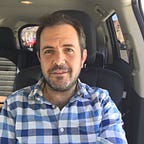Two dreams that are one
Will the State of Israel dare to dream a new dream, or will they follow the Maccabean dynasty into corruption?
Dreams were a recurring theme in the philosophical conversations my grandfather and I had back when he was alive. We would sit in the kitchen long into the night over biscuits and cups of tea debating passionately about our dreams; that of our people, our country and ourselves. Two weeks ago while going through some of my grandparents old things, I came across a sermon my grandfather wrote for one of his congregations back in 1965. While written many years ago, it could have just as well, been written today. It’s topic; dreams, was somewhat ironic, leaving me to feel as if it were written as a continuation to one of our previous conversations.
So here I come to share and continue in that conversation once again. Only this time, far beyond the confines of that little kitchen. He began by reminding me of Pharaoh and his two dreams. Yet Joseph, he continued, claims that both dreams are actually one. What did he mean by that? Why are Pharaoh’s two dreams only one, while Joseph’s who also had two dreams earlier on in the biblical narrative is described as having two different dreams? How are these two instances different?
It is interesting to note that this Parsha of ours also coincides with Hanukkah, a holiday that coincidently celebrates the realization of two dreams as well. That of freedom from the Seleucid Greeks and that of a Jewish spiritual revival. Are these two dreams also only one, or are they two?
The Rabbis and the Maccabees seem to disagree on this one. While the Maccabees recognize both dreams coming true in the victory of Hanukkah as one, The Rabbis recognize these as two separate dreams, a materialistic one, and a spiritual one. Winning the war, a materialistic ‘dream come true’, is not ‘one and the same’ as the revival of Jewish values in the newly founded Jewish Kingdom. So while the book of the Maccabees tells of the realization of both these dreams in one, the Gemara chooses to ignore the materialistic dream completely and only tells of a spiritual miracle of the growing light of Hanukkah.
The Rabbis, who had quite a disdain for the Maccabean rule, attempted to clearly distinguish between these two dreams and took a series of measures to that end. First, the Maccabean story never made it into the Talmud, only the story of the Jug of oil. Then they made sure that the Maccabees book never made it into the Bible and continued this line of thought by matching the Haftarah portion of Shabbat Hanukkah with the book of Zecharia. As mentioned in yesterdays Hanukkah essay — God tells the prophet who is perplexed by the vision he just had that victory alone is not enough, true freedom and everlasting peace are a product of the divine spirit. Once the materialistic dream is realized, we must dream on, a second dream, a spiritual one. If not, we will be left with a shell that holds no content. This is the difference between the two dreams that lend meaning to last weeks portion:
Both of Pharaoh’s dreams were of materialistic nature, there for, they were in fact only one. While Joseph had two dreams, one of materialistic nature, and later one that told of spiritual growth.
My Grandfather then goes on to ask the same questions of the Zionist dream. In 1965 Israel is but 17 years old, yet my grandfather recognizes the need for a new dream now that the materialistic one of 1948 was realized. The Maccabees, he says, made a mistake. They had only one dream, a materialistic one. Their dynasty ended up being one of the most corrupt governments that our people have seen. Will the State of Israel end up like the Hashmonite dynasty, obsessed with materialistic dreams of land and capital? Or will Israel have the courage to dream a second dream, a spiritual one, one that in the spirit of the light of Hanukkah, will light up our lives and remind our country of it’s purpose to inspire the world in peace?
Will the Jewish people dream like Pharaoh or like Joseph? Will they stay obsessed with themselves, licking old wounds, or will they look beyond themselves and seek to heal a hurting world? As we light the candles of Hanukkah, may we all be inspired to dream another dream. For the sake of our country, for the sake of our people, for the sake of humanity.
Chag Urim Sameach!
